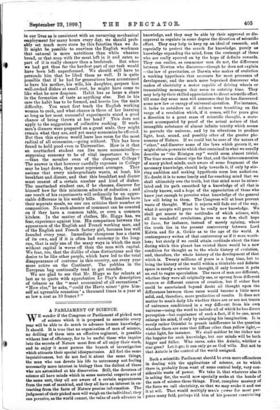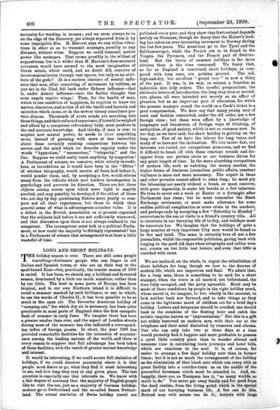A PARLIAMENT OF SCIENCE.
WE wonder if the Congress or Parliament of picked men of science which it is proposed to assemble every year will be able to do much to advance human knowledge. It should. It is true that no organisation of men of science, no drilling of them into an effective regiment, is possible without loss of efficiency, for to be useful those who inquire into the secrets of Nature must first of all enjoy their work, and to enjoy it mast pursue the branch of investigation which attracts their special idiosyncrasies. All feel the same inquisitiveness, but do not feel it about the same things, the man who can devote his life to astronomy not feeling necessarily more interest in biology than the dullest of those who are astonished at his discoveries. Still, the devotees of science all have minds which in some material respects are of the same sort, they all are aware of a certain separateness from the rest of mankind, and they all have an interest in ex- tracting from the facts of Nature precise information. The judgment of their picked men will weigh on the individual, they can perceive, as the world cannot, the value of each advance in knowledge, and they may be able by their approval or dis- approval to regulate in some degree the direction of scientific
effort. They may help to keep up an ideal of research, and especially to protect the search for knowledge, purely as knowledge expanding the mind, from the contempt of those who are really spurred on by the hope of definite rewards.
They can realise, as commoner men do not, the difference between Newton who discovers—though he does not explain
—the law of gravitation, or Darwin who makes of evolution a working hypothesis that accounts for most processes of development, and the much more bepraised discoverer who makes of electricity a motor capable of driving wheels or transmitting messages that seem to outstrip time. They may help by their skilled appreciation to direct scientific effort till some day some man will announce that he has discovered some new law or energy of universal operation. For instance, it looks to outsiders as if science were trembling on the verge of a revelation which, if it comes, will for years give a direction to a great mass of scientific thought, a state- ment accompanied by proof of the actual nature of that intangible substance of almost infinite tennity which seems to pervade the universe, and by its vibrations to produce light, heat, sound, and possibly other of the greater phe. nomena of Nature. If we could but be sure of the nature of "ether," and discover some of the laws which govern it, we might obtain powers to which that contained in what we usually describe as " the Röntgen ray " would seem almost trivial. The time seems almost ripe for that, and the intercommunion of many picked minds, each aware of some fragment of the necessary knowledge, should help towards it, if only by stir- ring ambition and making hypothesis seem less audacious. No doubt it is to some lonely and far-reaching mind that we shall ultimately owe the truth, but that mind must be stimu- lated and its path smoothed by a knowledge of all that is already known, and a hope of the appreciation of those who know just enough to perceive what knowledge of the general law will bring to them. The Congress will at least prevent waste of thought. What it rejects will fade out of the way, what it accepts will prove to be really new knowledge: We shall get nearer to the certitudes of which science, with all its wonderful revelations, gives us so few, shall hope to know, for instance, instead of merely opining, where the truth lies in the present controversy between Lord Kelvin and Sir A. Geikie as to the age of the world. A contemporary writes of that controversy as if it were worth- less; but surely if we could attain certitude about the time daring which this planet has existed there would be a new condition for thought as to the whole history of evolution, and, therefore, the whole history of the development of that which is. Twenty millions, of years is a long time, but to bring the history of the world within a thinkable and definite space is surely a service to thought, if only because it puts an end to vague speculation. The races of man are different, whether they were all originally one, or sprung from different sources or different centres of creation, but if either fact could be ascertained beyond doubt all thought upon the differences between those races would become a little more solid, and, therefore, more productive of results. It does not matter to man's daily life whether there are or are not traces of universes conditioned in a way different from his own universe—using the word to include all of which he has direct perception—but cognisance of such a fact, if it be one, mast enlarge his mind, if only by enlarging his imagination. It is surely rather Oriental to preach indifference to the question whether there are suns that diffuse other than yellow light,— violet light, for instance. We shall neither be the richer nor the happier for such knowledge, but our minds will be both bigger and fuller. Who cares, asks the Asiatic, whither a star goes? Let it go; it can only go as God wills. But not to that Asiatic is the control of the world assigned.
Such a scientific Parliament should be even more efficacious in dealing with the applications of science, as to which there is, probably from want of some central body, very con- siderable waste of power. We take it, that whatever else it is asking for, the world now specially seeks at the hands of the men of science three things. First, complete mastery of the force we call electricity, so that we may evoke it and use it at will. That would multiply man's rower for most pur- poses many fold, perhaps *rid him of his present constricting necessity fur working in masses; and we seem always to be on the edge of the discovery, yet always separated from it by some impalpable film. M. Marconi says we can utilise vibra- tions in ether so as to transmit messages, possibly to any distance, without wires. Suppose we could transmit motive power like messages. That seems, possibly is, the wildest of suppositions, but is it wilder than M. Marconi's demonstrated successes would have seemed to the most imaginative of Greek minds, which could, and no doubt did, conceive of intercommunication through vast spaces, but only as an attri- bute of the gods ? (It is a curious instance of mental influ- ence that men, after conceiving of movement by volition, as you see in the Iliad, fell back under Hebrew influence—that is, under Asiatic influence—into the feebler thought that even angels require wings.) Then, for the health of man, which is one condition of happiness, he requires to know the nature, character, and action of all the bacilli and bacteria and microbes which cause, or in the newest theory sometimes pre- vent, disease. Thousands of acute minds are searching into those things, and their collected experience, if it could he weighed and sifted by a competent referendary body, must produce in the end accurate knowledge. And thirdly, if man is ever to acquire new mental power, he needs to boy, something more, instead of guessing with more or less imbecility about those certainly existing connections between the nerves and the mind which we describe vaguely under the words "hypnotism," "mesmerism," "telepathy," and the like. Suppose we could really teach anything by suggestion ! A Parliament of science, we conceive, while utterly incredu- lous, as incredulous as it would have been in the "fifties" of wireless telegraphy, would receive all facts laid before it, would ponder them, and, by accepting a few, would release many from the ridicule which now hinders investigation in psychology and perverts its direction. These are but three objects among scores upon which more light is eagerly awaited, and may possibly be developed if the ablest of those who are day by day questioning Nature meet yearly to com- pare not all their experiences, but those to which their general sense of what is advantageous attaches value. It is a defect in the British Association as at present organised that the subjects laid before it are not sufficiently winnowed, and that discussion upon them is not always confined to the competent. The incompetent must talk in a political Parlia- ment, or how could the majority be fittingly represented ? but in a Parliament of science that arrangement is at least a little wasteful of time.



































 Previous page
Previous page